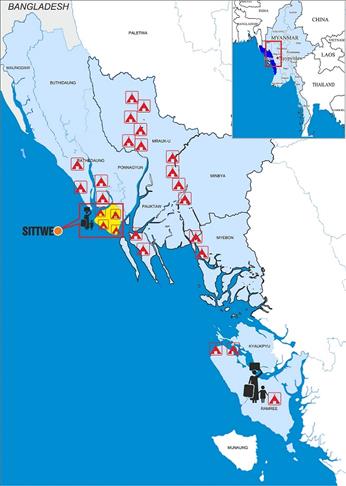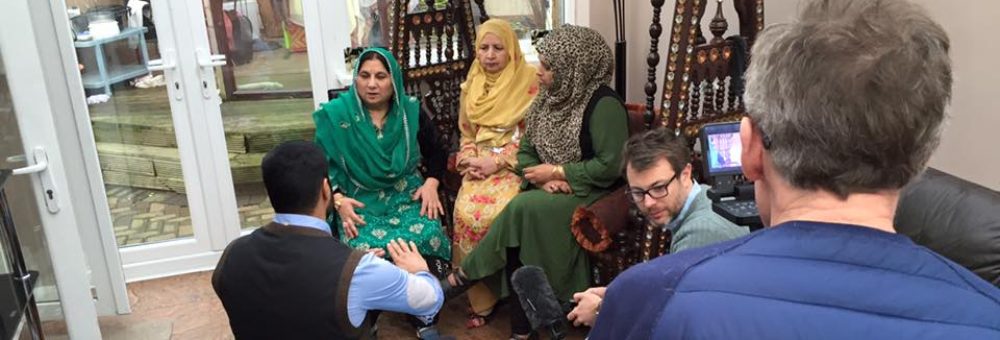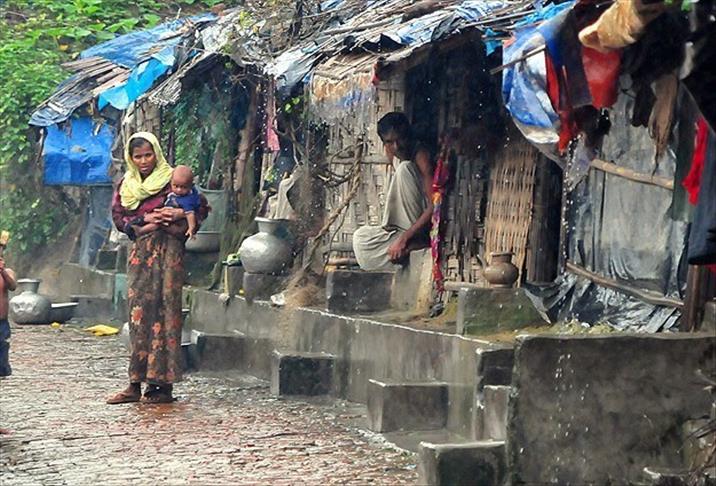In a series of features, Anadolu Agency correspondent Assed Baig, reveals the extent of oppression inflicted on Rohingya Muslims.

SITTWE, Myanmar
In Sittwe, the capital of the Rakhine state in Western Myanmar, reaching Rohingya camps and villages means navigating past police checkpoints manned by armed officers. The Rohingya are not allowed beyond this point. They are essentially trapped in their own areas because leaving requires special permits that can only be obtained through a long and expensive process.
“We look at that checkpoint everyday, we can never go past there. We’re stuck here, how many people have the money to pay for the permits and bribes to be able to travel to other areas?” says Tahir, a driver who took the Anadolu Agency (AA) to the Rohingya camps.
Boxed in by land, their only route of escape is the sea, where hundreds have perished trying to reach Malaysia, Bangladesh and sometimes more distant destinations. Regardless, they still risk the perilous journey, sometimes paying people traffickers only to end up in the hands of criminals in Thailand, who demand Rohingya families pay ransoms for their release. Others set out on fishing boats by themselves, risking imprisonment by Myanmar’s authorities if intercepted; those stopped by Bangladesh’s authorities are forced back to sea. Some Rohingya have ended up being sold into slave labor on fishing boats at sea.
Even those who pay bribes to seek official permission to travel are not guaranteed permits. Simply reaching other Rohingya villages within Rakhine state is sometimes impossible. Couples waiting to get married, but who live in separate parts of Rakhine, struggle with arranging the unlikely event of coming together for their wedding union.
The first village beyond the police checkpoint is Bu May. Police stand around doing nothing except watching the Rohingya come in and out. They enforce a curfew at 8pm everyday, putting out barbed wire fences and not allowing anyone to leave or enter. In the event of an attack by Rakhine Buddhists, this village is first in the firing line. The police presence however, is hardly reassuring for the Rohingya. According to a Human Rights Watch report published in 2013, the police were implicated in the violence against the Rohingya who, like other minorities in the country, place little faith in the authorities’ willingness to protect them.
Even children remember the role of the authorities in the violence. One child told AA: “I remember the police attacking the village, first it was the Buddhist mobs, then the police.” She trembles as she looks directly at a police officer standing at the barbed wire fence outside Bu May.
The conditions in Rohingya areas are a world away from the Rakhine parts of Sittwe. Apart from a few who have generators, the Rohingya go without power. There is no running water, only some hand-powered water pumps installed by international aid agencies. The road, if you can call it that, has potholes that limit travel speeds to 10 mph, although bicycle rickshaws and walking are the main form of transportation anyway. Most of the area has no roads, only a dusty, sandy terrain that cars attempt to tackle with wheels that struggle for traction.
In contrast, downtown Sittwe has roads, electricity, hotels, restaurants, Internet cafes and running water. You can buy a fridge and washing machine in Sittwe town; the Rohingya can only dream of these comforts. Abandoned mosques in Sittwe town are left as a quiet symbol of the attacks which forced the Rohingya Muslims out; police stand guard at their entrances, preventing extremists from wiping away the last signs that Rohingya ever existed in Sittwe town.
The Rohingya rely on supplies from a handful of Rakhine, motivated by compassion or economic benefit, who will still do business with them. Last year, the consequences for one such Rakhine driver was to be beaten by Buddhist extremists and paraded through Sittwe town with a sign around his neck, labeling him a traitor.
Though the goods are coming from only a few miles away, the Rohingya have to pay drivers extra to bring the goods in, leading to prices comparable to international imports. For food, many rely on the distribution of rice bags provided by international donors and the World Food Programme.
– The camps
Two years on from the violence that drove the Rohingya into camps, there are still Rohingya living in make-shift tents; made from empty rice bags to protect themselves from the sun and rain and dry grass to separate themselves from the earth below. Some have only one small tent for families of five or more. Inside, they are bare, with whatever little food they have placed in the corner.
The camps fall into two categories, registered Internally Displaced Peoples (IDP) camps, which are eligible for food aid and have some wooden structures in place; and neglected, unregistered camps, which have to rely on the generosity of other Rohingya.
Almost everyone wants to return to their original homes in Sittwe town. One man, who lives in an unregistered camp, told AA that the Rohingya were being punished for fighting back against the mobs that attacked them.
Children play in the dirt whilst used water runs beside them through small self-made trenches in the camps. Others kick around an improvised football made from compressed paper. Two children sit in the shade making toys; cars out of empty food tins.
“We find it hard to get food, our children cannot get an education and it’s been two years and I have not received food from anywhere,” says Muhammed Raheem, a Tay Kyawan camp resident.
“I just want to go home to the Nasi quarter where I used to live, life was not like this, it was not this difficult, we are suffering,” he adds.
The state, for their part, continues to downplay any violence against the Rohingya and imply that both sides are equally responsible for violence by calling it a ‘conflict.’ It denies any sort of massacre has taken place, as was the case in January’s Du Che Yar Tan Massacre.
“The Rohingya burnt down their own houses,” says one Rakhine man in Sittwe.
The Myanmar authorities have repeated the same claim but AA could not find any Rohingya or eyewitnesses who saw people setting fire to their own homes.
– Education
Rohingya are not allowed to join Rakhine students at Sittwe University, which is located just beyond the checkpoint, its shiny windows and well-kept gardens taunting them.
Xavi, an English-speaking Rohingya NGO worker, is one of those who struggles with being denied the basic right to education.
“Studying before the violence was difficult enough with the discrimination we faced, but now, it is non-existent,” he says. “I had the grades to study medicine but I cannot. I’m not allowed to go to university.”
Despite the difficulties Xavi — like many of his compatriots — does not want to leave Myanmar.
“I want to stay and help my people. I want to raise the level of education and situation here,” he says.
He says he thinks 98 percent of Rohingya are uneducated, not through any fault of their own, but because circumstances mean they have no opportunities to pursue academic studies.
“We need to educate ourselves. No one is going to help us, not the Rakhine, not the government and not the international community,” he says defiantly. “We do not have the luxury of being afraid anymore, we must speak out.”
Xavi still has his certificate with the grades he achieved before the violence started. Articulate and well-spoken in English, he has not given up on his dream of going to university, no matter how distant or unachievable it may seem. As far as he is concerned, he has the grades and that should be all that he needs.
But in reality, grades are not enough on their own — Xavi is not the only one. Another young man pulled AA’s reporter aside in a market, keen to talk about education. “I want to tell the world that we are suffering, but we don’t need anything, we just need an education. I want to go to university,” he says.
Visibly upset, he bit his lip to hold back his emotions. With those few sentences he walked off. There are similar stories throughout the camps of young men and women trying to gain an education. They teach others and try to raise the consciousness of their people, but too often they themselves are targeted by the authorities.
The schools in the Rohingya areas are limited and cannot teach children until the age of eight or nine. Instead, many children are forced to work.
Five-year-old Abdullah sits on the beach with his father, picking fish out of a net. He started work when he was four-years-old.
“If they don’t work, we don’t eat,” says one father.
Read the original article published in Anadolu Agency on 26 February 2014

